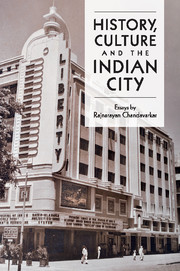Book contents
- Frontmatter
- Contents
- Acknowledgements
- Publisher's note
- Introduction by Dr Jennifer Davis, Wolfson College, University of Cambridge
- Bombay's perennial modernities
- Sewers
- Peasants and proletarians in Bombay city in the late nineteenth and early twentieth centuries
- State and society in colonial India
- Religion and nationalism in India
- From neighbourhood to nation: the rise and fall of the Left in Bombay's Girangaon in the twentieth century
- Historians and the nation
- Urban history and urban anthropology in South Asia
- Aspects of the historiography of labour in India
- Postscript by Professor David Washbrook, Trinity College, University of Cambridge
- Bibliography of the published works of Rajnarayan Chandavarkar
- Index
Aspects of the historiography of labour in India
Published online by Cambridge University Press: 17 March 2010
- Frontmatter
- Contents
- Acknowledgements
- Publisher's note
- Introduction by Dr Jennifer Davis, Wolfson College, University of Cambridge
- Bombay's perennial modernities
- Sewers
- Peasants and proletarians in Bombay city in the late nineteenth and early twentieth centuries
- State and society in colonial India
- Religion and nationalism in India
- From neighbourhood to nation: the rise and fall of the Left in Bombay's Girangaon in the twentieth century
- Historians and the nation
- Urban history and urban anthropology in South Asia
- Aspects of the historiography of labour in India
- Postscript by Professor David Washbrook, Trinity College, University of Cambridge
- Bibliography of the published works of Rajnarayan Chandavarkar
- Index
Summary
The Labour in Asia research programme is, it seems to me, a particularly important initiative because it registers and aims to build on the growing scholarly interest and increasing activity in the 1990s in Indian and Asian labour studies. It is significant that the first volume to appear in the newly projected Economic History of South-East Asia is Elson's The Death of the Peasantry, and Amarjit Kaur's work on labour is, I understand, due shortly to follow. Among historians and social scientists of India, the working classes, broadly construed, have also commanded increasing attention, as several conferences (at least two here in Amsterdam) and perhaps, more substantially, the numerous books, articles and theses which have recently been published, testify. Recent conferences in Calcutta, Bombay and most recently Delhi have suggested a quite considerable depth of interest and output. In the University of Cambridge alone, not in this field known for its radicalism or its particular concern with the history of subordinated and oppressed groups, there have been a dozen or more doctoral theses written or in progress on various aspects of the working classes in India – from studies of communism to the political movements of the urban poor, gender relations and household formation, child labour and the spatial politics of neighbourhoods, mill townships and urban squatter settlements, labour movements and caste, ethnic and communal conflicts.
- Type
- Chapter
- Information
- History, Culture and the Indian City , pp. 236 - 250Publisher: Cambridge University PressPrint publication year: 2009
- 1
- Cited by



